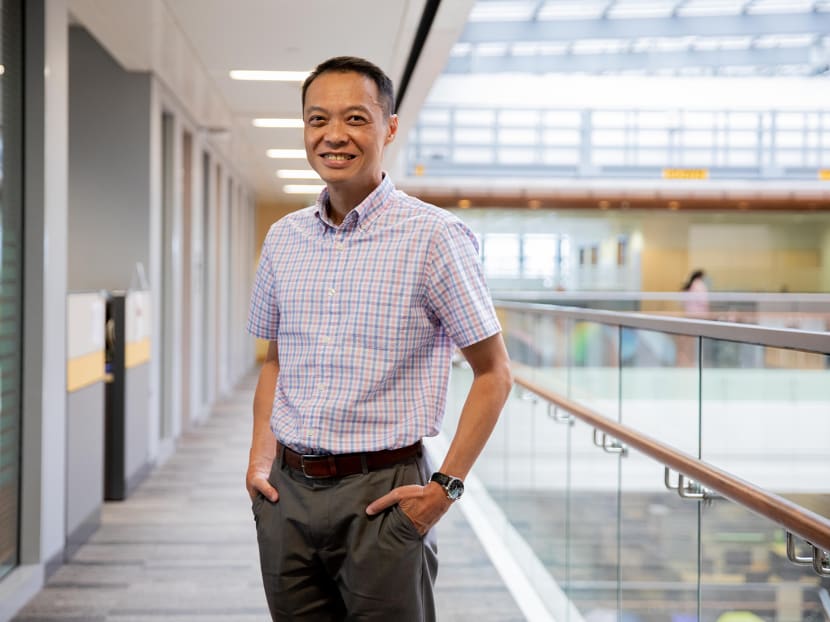Up Close With… Professor Ooi Eng Eong, co-developer of Singapore’s Covid-19 vaccine candidate
In this instalment of Up Close With, TODAY journalist Tessa Oh speaks to Professor Ooi Eng Eong from the Emerging Infectious Diseases programme at Duke-NUS Medical School.

Professor Ooi Eng Eong is the co-developer of Singapore’s Covid-19 vaccine candidate, which will soon complete the second phase of its clinical trials.
In this series, TODAY’s journalists meet the people behind the headlines.
In this instalment, Tessa Oh speaks to Professor Ooi Eng Eong from the Emerging Infectious Diseases programme at Duke-NUS Medical School.
Prof Ooi is the co-developer of Singapore’s coronavirus vaccine candidate.
The Arct-021 vaccine, previously known as the Lunar-Cov19 vaccine, will soon complete the second phase of its clinical trials and is waiting to begin its third and final phase.
Speaking to TODAY late last month, Prof Ooi talks about how he got into the field of infectious diseases, the challenges of developing a Covid-19 vaccine candidate, and how scientists can communicate public health messages better.
Excerpts of the interview below have been edited for length and clarity.
Tessa: What drew you to a career in infectious diseases? Was your family supportive?
Eng Eong: I went to medical school in the United Kingdom and came back and did my housemanship here in Singapore. But when I was doing my housemanship, I decided that although I really liked the subject of medicine, much of medicine really was like patching a hole; you never actually solve the problem... So I decided after the end of my housemanship that I wanted to solve the problem. To solve the problem, you need to understand what exactly (it is), so I thought research was the way to go.
… I got a position in the microbiology department of the National University of Singapore. And I did a PhD with Professor Chan Soh Ha. The PhD was on nasopharyngeal cancer because I thought that was what I was going to be interested in. The PhD went well, and I really enjoyed what I did. But at the same time, I realised that I didn't want to end up competing with my mentor... So when I finished in 1998, Singapore had at that time the largest outbreak of dengue in its history, (but) no one was working on dengue then… It was a gap that needed someone to work on and so I went into it. It's not like I went into infectious disease by choice; it was by opportunity.
Tessa: Was your family surprised by your decision?
Eng Eong: My wife was very supportive. If not for her support, I wouldn't have ended up in research. I had to take a pay cut to do this, (but) she was supportive. My father was more taken aback by my decision. For him, putting his son through medical school then (was because) he wanted his son to become a doctor… so that was the harder part — convincing him that this was the right thing for me to do as a career. He's passed on now, but I'm glad he lived to see the day that I became a full professor.
Tessa: As the pandemic unfolded, were your friends and family concerned for you or did they take more of an interest in your work? Have you found yourself having to field a lot of questions about viruses and vaccines?
Eng Eong: The lab is an extremely safe place. For example, the space in which we grow the viruses is separated from us by multiple barriers. And then the people working on it will be wearing what looks like a space suit, with its own air supply, because (we work in a) Biosafety Level Three lab.
In terms of the other parts that came with the pandemic... there's a lot more pressure to respond to the need for information (such as) having to do interviews and answer queries from the press. But at the same time, the reason I wanted to do this (job) and get into academia is so that the information is shared. If all we do is research, and the information is not made available to the public that paid for the research, because all these are funded by tax dollars, then something is wrong… So I feel that it is an obligation that I should now give back to society that has enabled the research that I've done.
The main challenge now is to rephrase what we know, or what we do in science, in language that people can understand. That can be a major challenge.
Tessa: Is it strange to be thrust into the public eye and, like some of your colleagues in the field, become household names as a result of the pandemic?
Eng Eong: It's still something that I'm not quite used to. You kind of learn to value the privacy that you had. Sometimes, it is nice… I've met people who have come up to me on the street and said: “I watched that webinar (you were on) and I got vaccinated, because you said this.”
I understand that part of it is a responsibility that if scientists and clinicians do not speak up, then where would the public get their information from? Then don't blame them if they believe (what they see on) social media, which is spreading (misinformation).
Tessa: You have been leading the team at Duke-NUS to develop Singapore’s Covid-19 vaccine. Can you tell us how the project started and how the journey has been so far?
Eng Eong: The thinking at the start of the pandemic was that even if Singapore had all the reserves it had... we (still may not be able to) buy one, because no one's going to sell us a vaccine. Whichever company or country that manufactured the vaccine, they're going to keep it for themselves. Singapore will get only the excess. So having a vaccine of our own was an insurance that in the event that we cannot get anything, we can still take care of Singaporeans.
(Because I had been working with vaccines in the past), when I was given this opportunity, I said: “Yes, I can do this.” And especially since the company that we're going to collaborate with, Arcturus Therapeutics in San Diego, was developing a self-replicating ribonucleic acid (RNA) vaccine, (which I am familiar with). So I felt confident at that time that we knew enough to know how to select a vaccine.
Tessa: It has been more than a year since the project started. What are some of the challenges of developing a vaccine against a virus that is mutating so quickly?
Eng Eong: One thing that we and Arcturus didn’t have was that, (unlike the other Covid-19 vaccine manufacturers such as Pfizer-BioNTech and Moderna, which tested their messenger RNA technology on other vaccines such as those for cancer), neither of us had taken a vaccine into that space where we (trialled the type of vaccine we are developing) several times. We didn't have any experience that we could fall back on and say to (regulators) such as the Health Sciences Authority and the Food and Drug Administration in the United States that we are confident (about the vaccine) based on all the experience that we have. We were starting from scratch.
For me, now, what's happening is taking the time to gather as much information as possible to prepare for the next big outbreak… The imperative is to learn as much as we can about how to make good vaccines and get them into clinical trials and into approved use as quickly as possible.
What are the key barriers? There are some people in the community who are dead against vaccines. On that, there’s nothing much we can do.
But there's a sizeable proportion that are worried about the long-term effects... So can we make (the vaccines) safer? Can we make the RNA vaccines more tolerable? Can we do more modification to make it less reactive, to cause fewer side effects but sustain the same immunity? Can we make a vaccine that works with just a single shot?
And I think the answer is we can… So those are some of the research we're trying to do now.
Tessa: Is it frustrating to be put under the pressure of having to quickly develop the vaccine in this environment where, a year ago, everyone was waiting for vaccines to get out of the pandemic?
Eng Eong: No doubt that there was a lot of pressure… But there were people who were getting sick, and nothing could be done. Some people are also dying from it. If we want to make a difference, we simply have to move as fast as we can.
If we had to do this all over again… in hindsight, it wouldn’t just be one shot. We don't go into a football match and say we have one strategy — we're going to take one shot at the goal in 90 minutes. If we miss, it will be zero. Nobody does that, right?
We ought to have taken multiple shots at goal. Try to at least have different teams focusing on different technologies, with the aim of developing that one vaccine and, whichever that gets through all the regulatory hurdles first, that's the one. At least it's the first solution. It may not be the best solution, but it is a solution. Then let the best solution take its time.
Tessa: As you said, there is a group who is sceptical about vaccines, how fast they were developed and so on. What’s your response to people who have these concerns?
Eng Eong: The reality is that the vaccine side effects tend to show up very quickly. At the very most, within a week of receiving the vaccine, all the side effects will show up. Then you have the side effects that are very rare that tend to come about two weeks, maybe three weeks later, but certainly by six weeks after you receive the vaccine, (you will see them). These are the rarer side effects such as myocarditis (an inflammatory condition affecting the heart muscles) and Guillain-Barre syndrome, where you get paralysis.
… This notion that 10, 20 years later, you will get side effects from the vaccine is a myth. How do you even know that whatever (illnesses) you have now is because 20 to 30 years ago, you received a vaccine in childhood? No one knows that. And there's no such thing. But people perpetuated this myth and spread it on social media.
How do you overcome this? Not everything can be dealt with in science… (but) if there are areas where science can step in and say definitively that this doesn't occur, then we should be doing those things.
Tessa: Do you think part of the problem is that we are not communicating the benefits and safety of vaccines well enough?
Eng Eong: I feel that we in science and medicine need to take a critical look at ourselves. You asked me the question of how I felt to be more visible, and the answer was it's not something I signed up for, but I understand it’s something I needed to do.
But it is a crisis. If you leave it to me, during peacetime, when there's no outbreak, I'll probably just go back to doing what I usually do. And maybe that's a problem. Because then, you popped up out of nowhere. And to the public, (they would wonder): “Do I listen to you? Who are you?” So you kind of need time to build that trust.
So maybe there's something that we need more of… voices that can stay objective, impartial. If we can build a body of voices that will be consistent and provide the facts, in ways that the public can understand, then maybe in a time of crisis, that's the first point that people will turn to.
Have views on an issue or a news topic you care about? Send a letter to voices [at] mediacorp.com.sg with your full name, address and phone number.








